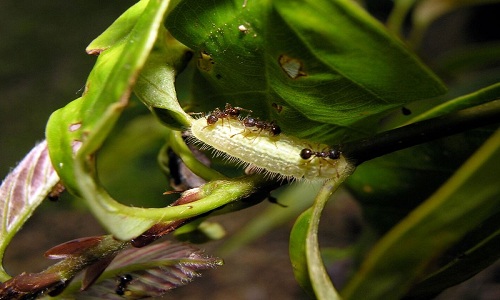How do caterpillars turn into bodyguards?
Japanese scientists have discovered the secret to helping caterpillars capture ants and turn them into bodyguards for it.
The reason why ants become loyal guards of caterpillars
Caterpillars secrete a sweet-smelling compound that makes the ants addicted and volunteered to be slaves. New discoveries by Japanese scientists have changed the traditional notion of " fair exchange" between insects.

Sweeteners caused by caterpillars secrete ants into its loyal guards.(Photo: Masaru Hojo.)
A team at Kobe University, Japan , found that ants serving green moths regularly, they forgot both daily activities and quests for food. Previously, scientists believed that voluntary ants met caterpillars in symbiotic relationships to take advantage of a syrupy, sweet-smelling compound released by caterpillars.
The ants line up to serve caterpillars for two hours, take sweeteners and leave. However, these ants are also loyal guards who often stand guard for caterpillars.
Scientists discovered caterpillars controlling its bodyguards through chemical signals and visual cues. The ants taste sweet start to receive the signal from the tentacle's movement on the caterpillar and follow its direction.
Because caterpillars must transform into safe butterflies, they curl up in a cocoon. In this period, it needs to be protected from predators such as wasps and spiders. Strong chemical signals released from this vulnerable creature help it gather a fierce and loyal bodyguard.
"The glandular cells near the tentacles can produce chemical signals. Both visual and chemical signals stimulate the aggression ," New Scientist quoted Masaru as a researcher on July 31. Hojo.
The team found that slave ants had dopamine concentrations, a chemical responsible for the movement and aggression of insects, lower than those who didn't taste the sweetener. After absorbing a drug called reserpine, it prevents the spread of dopamine, ants become less dependent on moths.
" Lycaenid secretions from the body on the back of caterpillars can control the behavior of ants by altering dopamine regulation and increasing loyalty to partners, " Hojo and colleagues concluded.
- Caterpillars fake snakes escaping predators
- Caterpillars wear spider mite
- Caterpillars are evolving to cope with climate change
- Caterpillars know how to eat poison to defend themselves from enemies
- Caterpillars have a snake-like shape
- Horror of caterpillars knows 'makeup' into snakes
- 'Ghosts' row in England
- Discover the first amphibian insect
- Believe it, this worm has a face ... Hello Kitty
- Carnivorous moths are homosexual because of plant defenses
- Caterpillars and pika share a scarce food source in the Arctic
- Caterpillars fake ants tricking artificial intelligence
 Why do potatoes have eyes?
Why do potatoes have eyes? 'Tragedy' the world's largest carnivorous life: Death becomes ... public toilet
'Tragedy' the world's largest carnivorous life: Death becomes ... public toilet Tomatoes were once considered 'poisonous' for 200 years
Tomatoes were once considered 'poisonous' for 200 years Detecting microscopic parasites on human face
Detecting microscopic parasites on human face